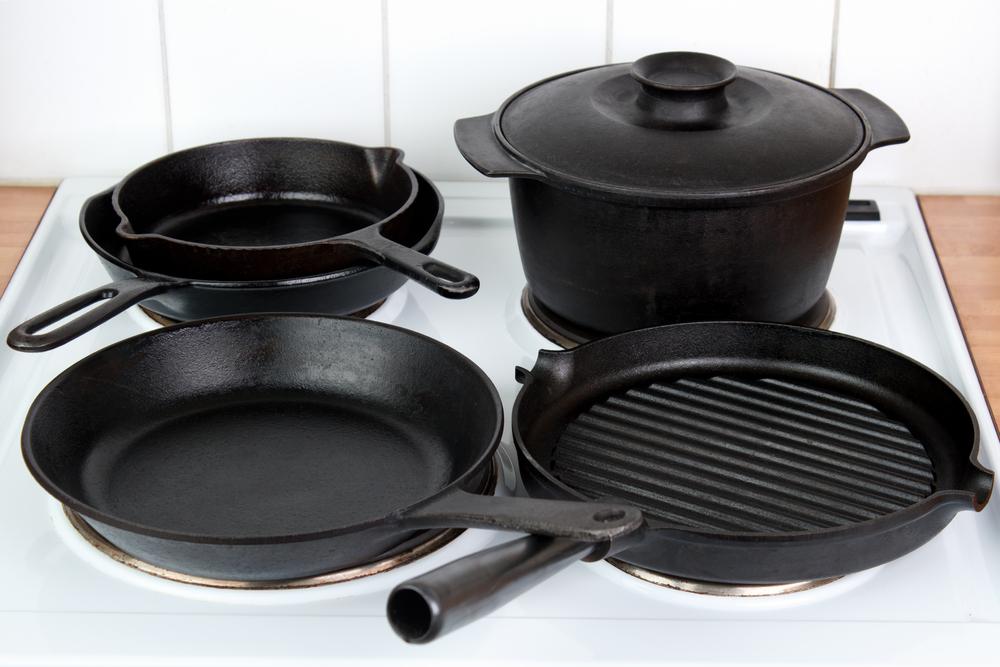
Switch to a Cast Iron Pan to Avoid Chemicals and Gain Other Health Benefits
You may remember your mom (or grandma?) swearing by one as a kid. If you're like a lot of people, you have one tucked away in the shadows of your cabinet, collecting dust, and always passed over in favor of a newfangled pan instead. Cast iron pots and pans are actually one of the oldest forms of cookware. And, as it often goes with old stuff, these things may go out of style or preference, but they still work just as good.
Do a quick Google search of the benefits of cast iron pots, and you're going to get a lot of insight from average kitchen dwellers about how well the pans brown peach crisp or why they will cook their biscuits in nothing else. However, beyond the basic advantages of a good, heavy pan any chef could tout, these pots can have health benefits to offer too.
1. Get a (possible) Boost of Iron
If you've avoided using your iron pots because you heard that they can inject more iron in your food, you should know that this is not a bad thing. Iron serves a host of valuable purposes in the human body, and harvesting a little extra from the pan you're cooking in is not something bad. About 10 million U.S. citizens have an iron deficiency. Cooking with iron pans has been shown to actually elevate the iron levels in some foods. However, the levels of iron can vary drastically and no one really knows how much gets absorbed when you eat the food with the absorbed iron from the pan.
2. Avoid Ugly Chemicals with Bad Names
There are some pretty big and bad chemicals that have given certain non-stick pans a bad name. One big bad chemical by the name of perfluorooctanoic acid, which also goes by PFOA or C8, is found in some non-stick pans. The studies on PFOA are fairly abundant, and the bottom line is that it has been linked to certain types of cancer. The International Agency for Research on Cancer (IARC) has stated that PFOA is potentially carcinogenic to humans. Carcinogenic is a technical way to say that it could cause cancer in humans. Even though iron pots and pans can be non-stick with proper seasoning, they are free of PFOA.
3. Skip the Oil and Cut Calories
When properly seasoned, iron pans are just as non-stick as more modern pans, according to Michigan State University. If you have cut out using non-stick pans because of fear of chemicals, you may have bumped up your reliance on oils when you cook with other pans to prevent sticking. Unfortunately, most oils, such as coconut, olive oil, canola, and vegetable oil contain about 120 calories per tablespoon. Therefore, it is good for your health to switch to a well-seasoned, non-stick iron pan so you do not have to rely on those added calories just to keep your food from sticking.
4. Get Away from Potentially Hazardous Cleaning Detergents
Once an iron pan or skillet is properly seasoned, you can pretty much clean it out with a dry paper towel and move on with your life. Some people do choose to use something like kosher or sea salt and water to clean the pan after each use to remove any food bits or odors. Dishwashing liquid, or any type of detergent, will ruin the seasoned finish of the pan so it must be avoided. And, avoiding these detergents can actually be a major health benefit. Some top-name dishwashing liquids contain chemicals like methylisothiazolinone, FD&C yellow 5, and chemical fragrances, which can be linked to skin irritation, respiratory effects, and reproductive issues.
In closing ...
Go ahead, pull that old iron pot or pan out of the cabinet. Blow off the dust, check out how to season an iron pan, and get cooking. You may be doing your health a favor—and perfectly browned peach crisp and biscuits are nice too!
https://www.ncbi.nlm.nih.gov/pmc/articles/PMC3685880/
www.cancer.org/cancer/cancer-causes/teflon-and-perfluorooctanoic-acid-pfoa.html
https://www.ncbi.nlm.nih.gov/pubmed/12859709
https://www.canr.msu.edu/news/the_many_benefits_of_using_cast_iron_pans
https://www.medicalnewstoday.com/articles/326307.php
https://www.medicalnewstoday.com/articles/324844.php#nutritional-values





.png?v=14052428765372906161761701960) Previous Post
Previous Post
%20copy.png?v=62173825240595680121761701960)